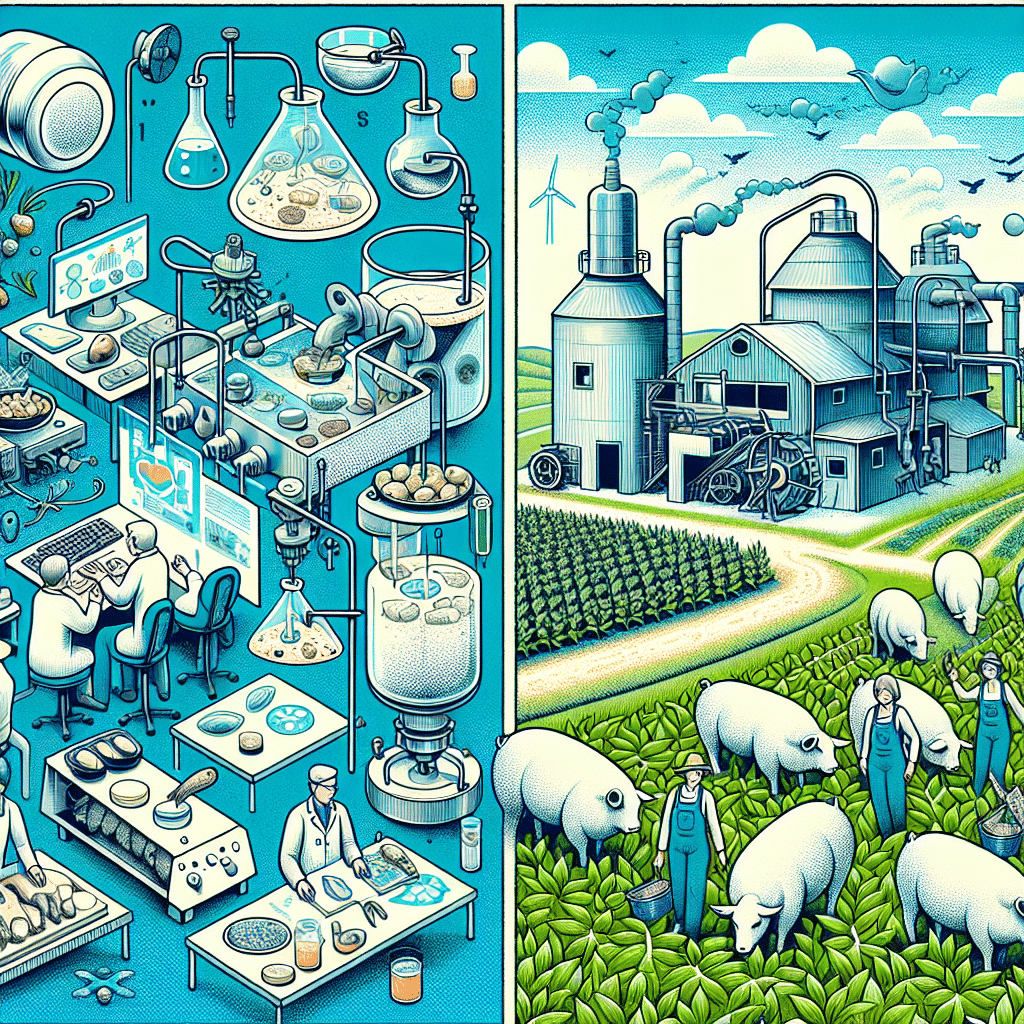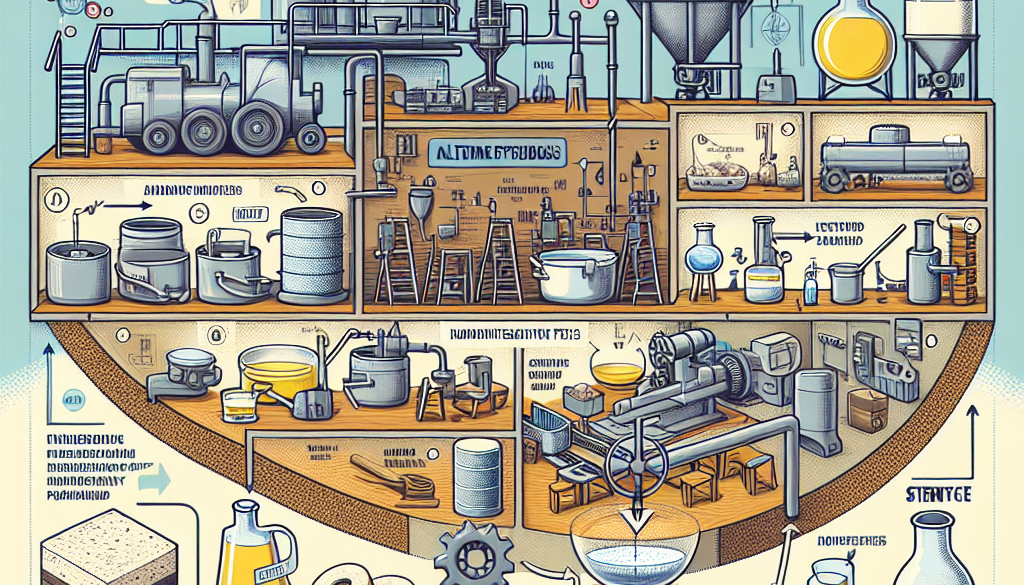Diverse Methods of Producing Alternative Fats
-
Table of Contents
- Exploring Diverse Methods of Producing Alternative Fats
- The Rise of Alternative Fats
- Plant-Based Fats: A Natural Substitute
- Fermentation-Derived Fats: The Next Frontier
- Cellular Agriculture: Cultivating Fats in Labs
- Chemical Synthesis: Crafting Fats Molecule by Molecule
- Benefits and Challenges of Alternative Fats
- Conclusion: The Future of Fats is Bright
- ETprotein: Your Source for High-Quality Protein Products
Exploring Diverse Methods of Producing Alternative Fats

As the global population continues to grow and environmental concerns become more pressing, the need for sustainable and healthy food sources is more important than ever. One area of innovation is the development of alternative fats, which can provide the same functionality as traditional fats but with a lower environmental footprint and improved health profiles. This article delves into the various methods of producing alternative fats, their benefits, and their potential impact on the food industry.
The Rise of Alternative Fats
Alternative fats are gaining traction as consumers seek healthier options and as the food industry looks to reduce its environmental impact. These fats are designed to mimic the taste, texture, and cooking properties of animal-based fats but are derived from plant-based or synthesized sources. The demand for alternative fats is not just a trend; it’s a response to the urgent need for sustainable food production systems.
Plant-Based Fats: A Natural Substitute
Plant-based fats are derived from sources such as nuts, seeds, and fruits. They are a popular choice for those looking to replace animal fats in their diet due to their health benefits and lower environmental impact.
- Avocado Oil: Extracted from the flesh of avocados, this oil is high in monounsaturated fats and has a high smoke point, making it ideal for cooking.
- Coconut Oil: Made from the meat of coconuts, it’s rich in medium-chain triglycerides (MCTs) and is often used in baking and confectionery.
- Algae Oil: Sourced from algae, this oil is high in omega-3 fatty acids and is a sustainable alternative to fish oil.
Fermentation-Derived Fats: The Next Frontier
Fermentation is a process that uses microorganisms to convert organic compounds into a variety of products. This method is now being used to produce fats that are structurally similar to those found in animal products.
- Microbial Fermentation: Companies are using modified yeast and bacteria to ferment sugars, producing oils and fats with specific desired properties.
- Precision Fermentation: This process involves engineering microorganisms to produce high-value fat molecules, such as those found in milk or cocoa butter.
Cellular Agriculture: Cultivating Fats in Labs
Cellular agriculture is a revolutionary approach to producing animal products without the need for raising and slaughtering animals. This technology is being applied to produce fats with a fraction of the land use, water, and greenhouse gas emissions associated with traditional livestock farming.
- Cultured Fat Cells: Scientists are able to grow fat cells in bioreactors, creating animal-like fats without the animal.
- Lab-Grown Dairy Fats: By culturing dairy cells, companies can produce milk fat without cows, which can then be used to make butter and cheese.
Chemical Synthesis: Crafting Fats Molecule by Molecule
Chemical synthesis involves creating complex molecules through controlled chemical reactions. This method can produce fats with specific characteristics that are difficult to obtain from natural sources.
- Structured Lipids: These are tailor-made fats with modified fatty acid profiles, offering potential health benefits such as improved metabolism and reduced cholesterol levels.
- Synthetic Biology: This field combines biology and chemistry to design and construct new biological parts, devices, and systems, including fats with novel properties.
Benefits and Challenges of Alternative Fats
Alternative fats offer numerous benefits, including reduced environmental impact, improved health profiles, and the potential to alleviate pressure on natural resources. However, there are challenges to overcome, such as consumer acceptance, regulatory hurdles, and scaling up production to meet global demand.
Conclusion: The Future of Fats is Bright
The diverse methods of producing alternative fats are paving the way for a more sustainable and health-conscious food industry. As technology advances and consumer demand for eco-friendly products grows, alternative fats are likely to become a staple in our diets. The key takeaways from this exploration are the innovation in fat production methods, the potential health and environmental benefits, and the importance of continued research and development in this field.
ETprotein: Your Source for High-Quality Protein Products
If you’re interested in incorporating high-quality protein into your products, ETprotein offers a range of organic bulk vegan proteins that are non-GMO and allergen-free. Their products, including rice protein, pea protein, and various seed proteins, are perfect for a variety of industries. With a commitment to quality and customer satisfaction, ETprotein is your go-to supplier for all your protein needs.
About ETprotein:
ETprotein, a reputable protein and L-(+)-Ergothioneine (EGT) Chinese factory manufacturer and supplier, is renowned for producing, stocking, exporting, and delivering the highest quality organic bulk vegan proteins and L-(+)-Ergothioneine. They include Organic rice protein, clear rice protein, pea protein, clear pea protein, watermelon seed protein, pumpkin seed protein, sunflower seed protein, mung bean protein, peanut protein, and L-(+)-Ergothioneine EGT Pharmaceutical grade, L-(+)-Ergothioneine EGT food grade, L-(+)-Ergothioneine EGT cosmetic grade, L-(+)-Ergothioneine EGT reference grade and L-(+)-Ergothioneine EGT standard. Their offerings, characterized by a neutral taste, non-GMO, allergen-free attributes, with L-(+)-Ergothioneine purity over 98%, 99%, cater to a diverse range of industries. They serve nutraceutical, pharmaceutical, cosmeceutical, veterinary, as well as food and beverage finished product distributors, traders, and manufacturers across Europe, USA, Canada, Australia, Thailand, Japan, Korea, Brazil, and Chile, among others.
ETprotein specialization includes exporting and delivering tailor-made protein powder and finished nutritional supplements. Their extensive product range covers sectors like Food and Beverage, Sports Nutrition, Weight Management, Dietary Supplements, Health and Wellness Products, and Infant Formula, ensuring comprehensive solutions to meet all your protein needs.
As a trusted company by leading global food and beverage brands and Fortune 500 companies, ETprotein reinforces China’s reputation in the global arena. For more information or to sample their products, please contact them and email sales(at)ETprotein.com today.












